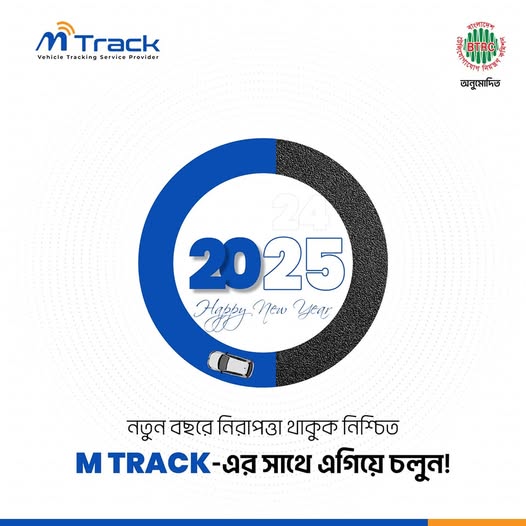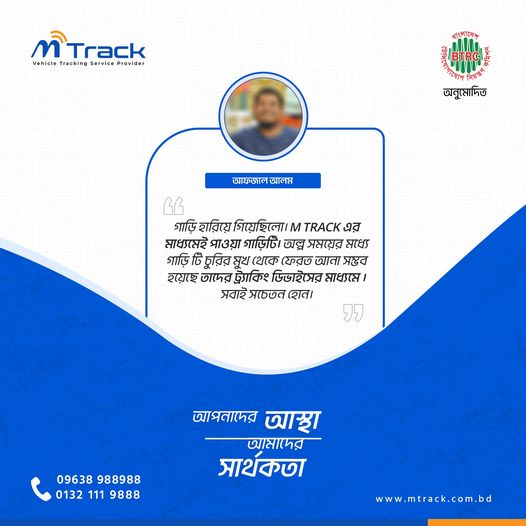1. Myth: GPS Tracking is Only for Large Fleets Many believe that GPS tracking is only beneficial for large fleets, but this is far from the truth. Even small businesses or individuals can reap the benefits of a MTrack vehicle tracking system. It helps monitor vehicle usage, improve route efficiency, and reduce fuel costs. Whether you have one vehicle or a hundred, GPS tracking can be a valuable tool.
2. Myth: GPS Tracking is Too Expensive The misconception that a vehicle tracking system is costly deters many from investing in one. However, modern GPS tracking solutions are highly affordable and offer a significant return on investment. They save money in the long run by reducing fuel consumption, preventing unauthorized vehicle use, and optimizing routes.
3. Myth: GPS Tracking Infringes on Privacy A common concern is that a vehicle tracking system invades personal privacy. In reality, GPS tracking is designed to enhance safety and operational efficiency. It is typically used by businesses to ensure that their vehicles are being used properly and efficiently. Employees are informed about the tracking, and it is used within legal and ethical boundaries.
4. Myth: GPS Tracking is Difficult to Use Some people believe that a vehicle tracking system is complicated and requires extensive training. In contrast, most GPS tracking systems today are user-friendly and designed for easy implementation. They come with intuitive interfaces, allowing users to access and understand data without needing technical expertise.
5. Myth: GPS Tracking is Only for Locating Vehicles While locating vehicles is a primary function of a vehicle tracking system, it offers much more. It provides insights into driving behavior, helps in route optimization, monitors vehicle maintenance schedules, and ensures the safety of drivers and cargo. The data collected can significantly enhance operational efficiency and reduce costs.
| Myth | Reality |
|---|---|
| 1. Vehicle Tracking Systems are Only for Large Fleets | Vehicle tracking systems benefit both large fleets and individual vehicles by improving efficiency, reducing costs, and enhancing safety. |
| 2. Vehicle Tracking Systems are Too Expensive | Modern vehicle tracking systems are affordable and offer significant cost savings through fuel reduction and operational efficiency. |
| 3. Vehicle Tracking Systems Invade Privacy | Tracking systems are used to monitor vehicle performance and safety, not personal activities, and are implemented with employee consent and within legal boundaries. |
| 4. Vehicle Tracking Systems are Difficult to Use | Most vehicle tracking systems are user-friendly with intuitive interfaces, making them easy to use without technical expertise. |
| 5. Vehicle Tracking Systems are Only for Locating Vehicles | In addition to location tracking, these systems provide insights into driving behavior, maintenance schedules, and route optimization, offering a range of operational benefits. |
The Legal Side of GPS Tracking: What Businesses Should Know
Implementing a vehicle tracking system can offer significant benefits to businesses, such as enhanced efficiency, reduced costs, and improved safety. However, it’s crucial to understand the legal implications before deploying GPS tracking within your organization. Here’s what businesses should know:
1. Employee Consent is Key Before using a vehicle tracking system to monitor company vehicles driven by employees, it’s essential to obtain their consent. In many jurisdictions, employers are required by law to inform employees about the tracking and obtain their explicit consent. This can be done through written agreements or by incorporating the terms into employment contracts. Failing to do so can result in legal disputes and potential penalties.
2. Privacy Laws and Expectations While businesses have the right to monitor their assets, employees also have a right to privacy. A vehicle tracking system should be used in a way that respects this balance. For instance, tracking employees during working hours is generally acceptable, but monitoring their whereabouts during personal time can lead to legal issues. Businesses should clearly define and communicate the scope of tracking to avoid infringing on privacy rights.
3. Data Security and Confidentiality The data collected by a vehicle tracking system is sensitive and must be protected. Businesses are legally obligated to ensure that the data is stored securely and is only accessible to authorized personnel. Implementing robust cybersecurity measures and following data protection regulations, such as the GDPR in Europe, is essential to prevent data breaches and legal repercussions.
4. Compliance with Industry-Specific Regulations Certain industries, such as transportation and logistics, may have additional regulations governing the use of a vehicle tracking system. For example, in some regions, there may be specific rules regarding the retention of tracking data or how it can be used in relation to driver hours and safety compliance. Businesses should familiarize themselves with industry-specific regulations to ensure full compliance.
5. Legal Use of Collected Data The data collected through a vehicle tracking system can provide valuable insights into business operations, but it must be used responsibly. Employers must ensure that the data is used strictly for legitimate business purposes, such as improving efficiency or ensuring vehicle safety. Using the data for unrelated purposes, such as disciplinary actions unrelated to vehicle use, could lead to legal challenges.
The Role of GPS Tracking in Reducing Carbon Footprint
As businesses and individuals become increasingly aware of their environmental impact, the role of technology in promoting sustainability has gained prominence. One such technology, the vehicle tracking system, plays a significant role in reducing the carbon footprint of transportation activities. Here’s how GPS tracking contributes to a greener planet:
1. Optimizing Routes for Fuel Efficiency One of the primary ways a vehicle tracking system helps reduce carbon emissions is through route optimization. By analyzing real-time traffic data and identifying the most efficient routes, GPS tracking minimizes the distance traveled and reduces idle time. This leads to lower fuel consumption, which directly correlates with a decrease in greenhouse gas emissions.
2. Reducing Unnecessary Vehicle Idling Idling vehicles consume fuel without moving, contributing significantly to carbon emissions. A vehicle tracking system can monitor idling times and alert drivers or fleet managers when vehicles are idling excessively. By reducing unnecessary idling, businesses can cut down on fuel waste and, consequently, their carbon footprint.
3. Promoting Better Driving Habits GPS tracking systems often include features that monitor driving behavior, such as speeding, harsh braking, and rapid acceleration. These behaviors not only increase fuel consumption but also contribute to higher emissions. By encouraging and incentivizing more eco-friendly driving habits through a vehicle tracking system, businesses can further reduce their environmental impact.
4. Streamlining Fleet Operations For businesses managing large fleets, the efficient utilization of vehicles is crucial. A vehicle tracking system helps in optimizing fleet operations by ensuring that vehicles are used only when necessary and are not overlapping routes or performing redundant trips. This efficiency leads to fewer miles driven overall, reducing both fuel usage and emissions.
5. Supporting Preventive Maintenance Regular vehicle maintenance is essential for optimal fuel efficiency. A vehicle tracking system can keep track of maintenance schedules, ensuring that vehicles are serviced on time. Well-maintained vehicles run more efficiently, produce fewer emissions, and use less fuel, contributing to a smaller carbon footprint.
Why Your Business Needs Real-Time GPS Tracking
In today’s fast-paced business environment, staying ahead of the competition requires efficiency, transparency, and control over your operations. One tool that can significantly enhance these aspects is a vehicle tracking system with real-time GPS tracking capabilities. Here’s why your business needs real-time GPS tracking:
1. Enhanced Operational Efficiency Real-time GPS tracking allows businesses to monitor the exact location of their vehicles at any given moment. This visibility enables more efficient route planning, quicker response times, and better coordination between drivers and dispatchers. A vehicle tracking system can help eliminate unnecessary delays, reduce fuel consumption, and ensure that deliveries are made on time, ultimately boosting overall efficiency.
2. Improved Customer Service Customers today expect accurate and timely information about their deliveries. With real-time GPS tracking, businesses can provide precise updates on vehicle locations and estimated arrival times. A vehicle tracking system allows you to keep customers informed, address any delays proactively, and enhance their overall experience, leading to higher customer satisfaction and loyalty.
3. Increased Safety and Security The safety of your drivers and the security of your cargo are paramount. Real-time GPS tracking provides an extra layer of protection by allowing businesses to monitor vehicles continuously. If a vehicle deviates from its expected route or encounters an issue, immediate action can be taken. Additionally, a vehicle tracking system can help in recovering stolen vehicles by providing accurate location data to law enforcement.
4. Cost Savings Through Reduced Fuel Consumption Fuel costs are a significant expense for any business operating a fleet of vehicles. By optimizing routes, reducing idle time, and encouraging better driving habits, real-time GPS tracking can lead to substantial fuel savings. A vehicle tracking system provides the data needed to analyze and adjust driving patterns, ultimately reducing fuel consumption and lowering operational costs.
5. Streamlined Fleet Management Managing a fleet involves overseeing multiple vehicles, drivers, and routes. A vehicle tracking system with real-time GPS tracking simplifies fleet management by consolidating all this information into a single platform. Fleet managers can monitor vehicle locations, driver behavior, maintenance schedules, and more, all in real-time. This streamlined approach helps in making informed decisions quickly, improving the overall management of your fleet.
6. Compliance and Reporting Many industries are subject to regulatory requirements related to vehicle use, driver hours, and more. A vehicle tracking system with real-time GPS tracking can automate the process of collecting and reporting this data, ensuring compliance with industry regulations. This not only saves time but also reduces the risk of fines and penalties.
How GPS Tracking Enhances Delivery Services
A vehicle tracking system enhances delivery services by optimizing routes, providing real-time updates, improving delivery accuracy, and increasing fleet security.
With a vehicle tracking system, businesses can efficiently plan routes, reducing travel time and fuel costs. Real-time tracking allows customers to monitor their deliveries, improving transparency and satisfaction. GPS tracking also ensures that deliveries reach the correct locations, minimizing errors and missed deliveries. Additionally, it enhances fleet management, boosts driver performance, and offers increased security by monitoring vehicles and preventing theft, all of which lead to reduced operational costs and improved service quality. Here’s how GPS tracking can transform your delivery business:
1. Optimized Route Planning A vehicle tracking system allows delivery companies to optimize their routes by analyzing real-time traffic conditions, road closures, and other factors that could affect delivery times. By selecting the most efficient routes, businesses can reduce travel time, save fuel, and complete more deliveries in a shorter period. This leads to faster, more reliable service for customers and cost savings for the company.
2. Real-Time Tracking and Updates Customers today expect transparency and timely information about their deliveries. With a vehicle tracking system, businesses can provide real-time updates on the location of delivery vehicles and estimated arrival times. This transparency enhances customer trust and satisfaction, as they can monitor their deliveries and plan accordingly.
3. Improved Delivery Accuracy GPS tracking helps ensure that deliveries are made to the correct locations, reducing the risk of errors and missed deliveries. A vehicle tracking system can guide drivers directly to the destination, even in unfamiliar areas, minimizing the chances of wrong deliveries. This accuracy is crucial for maintaining customer satisfaction and reducing costly returns or redeliveries.
4. Enhanced Fleet Management For businesses managing multiple delivery vehicles, a vehicle tracking system offers a centralized platform to monitor and manage the entire fleet. Fleet managers can track the real-time location of each vehicle, monitor driver behavior, and ensure that vehicles are being used efficiently. This oversight allows for better coordination, quicker decision-making, and improved overall fleet performance.
5. Increased Security and Theft Prevention Delivery vehicles often carry valuable goods, making them targets for theft. A vehicle tracking system enhances security by providing real-time location data, allowing businesses to track vehicles and recover them quickly in case of theft. Additionally, GPS tracking can monitor for unauthorized stops or deviations from the planned route, alerting management to potential security issues.
6. Reduced Operational Costs By optimizing routes, improving delivery accuracy, and reducing idle time, a vehicle tracking system helps businesses cut down on fuel costs and other operational expenses. Efficiently managed delivery operations mean fewer resources are wasted, which translates to lower costs and higher profitability for the company.
7. Better Driver Performance and Safety A vehicle tracking system can monitor driver behavior, including speed, acceleration, and braking patterns. This data allows businesses to identify and correct unsafe driving habits, reducing the risk of accidents and ensuring that deliveries are made safely. Improved driver performance also contributes to more efficient deliveries and better fuel economy.



